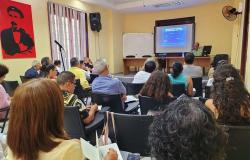The incorporation of the use of rail transport in the distribution chain represents a significant logistical innovation, since it contributes to the reduction of greenhouse gases, less susceptibility to unforeseen weather events and greater security for cargo.
Nestlé Chile, in alliance with the logistics integrator AP Moller – Maersk, incorporated the use of trains to transport its imported products that arrive in the country from the Port of San Antonio, which allows achieving greater operational efficiency, guaranteeing supply and contribute to the reduction of greenhouse gases in the distribution chain.
In this way, rail freight transport generates greater security in transportation, less susceptibility to unforeseen weather events and a reduction in risks associated with the security of cargo against possible theft. Likewise, a load by train or train allows several containers to be transported at the same time, which makes it possible to project a reduction in greenhouse gases.
“This strategic decision responds to the development of a transportation alternative that reduces the time spent on transfer and unloading processes, advances our sustainability goals and at the same time continues to innovate with logistical solutions that are scalable, to the extent that it allows us to evaluate in a second stage the use of rail transport for Chilean manufactured products destined for export,” explained Peter Weber, Supply Chain Director of Nestlé Chile.
For his part, Ignacio Urzúa, Sales Manager for FMCG (fast moving consumer goods) of Maersk on the West Coast of South America, expressed: “We are proud to begin this alliance with a strategic partner for us, as a starting point for new transcendental projects that will come in the future. We look for solutions that help make transportation more efficient throughout the supply chain, offering comprehensive solutions that not only improve logistics efficiency, but also offer better energy efficiency. Rail transport is not only fast and reliable, but also contributes to reducing the greenhouse gas footprint by moving more volumes of cargo at the same time.”
The incorporation of the train into Nestlé Chile’s logistics chain adds to the progress that the company has generated on its route towards decarbonization, such as its entry into electromobility in 2021, adding nine electric trucks to its operations.
Additionally, in 2022 it incorporated trucks that operate with Liquefied Natural Biogas (BioLNG) and a fleet of 30 trucks powered by Liquefied Natural Gas (LNG), the largest in circulation in Chile. This entire conversion is part of Nestlé’s global commitment to continue advancing in the implementation of efficient logistics solutions, with the goal of achieving zero net greenhouse gas emissions by 2050.


If you are interested in receiving news published in Diario Lechero, register your email here
If you are going to use content from our newspaper (texts or simply data) in any media, blog or Social Networks, indicate the source, otherwise you will be incurring a crime sanctioned by Law No. 17,336, on Intellectual Property. The above does not apply to photographs and videos, since their reproduction for informational purposes is totally PROHIBITED.











